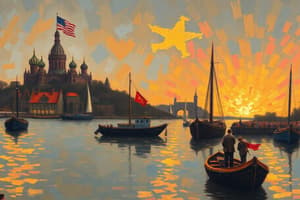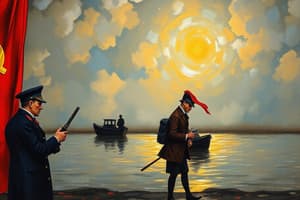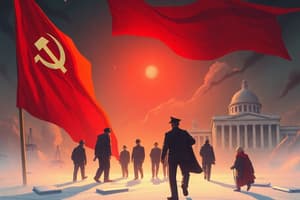Podcast
Questions and Answers
Which of the following scenarios exemplifies a proxy war during the Cold War?
Which of the following scenarios exemplifies a proxy war during the Cold War?
- Direct military conflict between the United States and the Soviet Union over control of Berlin.
- The United States providing economic aid to West Germany while the Soviet Union supports East Germany.
- A nuclear arms race between the United States and the Soviet Union, leading to a standoff.
- The Soviet Union and the United States supporting different sides in the Korean War without directly engaging each other. (correct)
How did the political division of Germany manifest physically during the Cold War?
How did the political division of Germany manifest physically during the Cold War?
- Through the unification of Germany under a neutral government.
- Through a series of treaties that ensured free movement between East and West Germany.
- Through the establishment of distinct economic zones controlled by the United Nations.
- Through the construction of the Berlin Wall, separating Soviet-controlled East Berlin from the Western-controlled West Berlin. (correct)
What was the primary objective of the Truman Doctrine?
What was the primary objective of the Truman Doctrine?
- To encourage cultural exchange programs with the Soviet Union.
- To promote free trade agreements between the United States and communist countries.
- To provide military and economic assistance to nations threatened by communist expansion. (correct)
- To establish a neutral zone between capitalist and communist states.
What was the ultimate result of the Vietnam War?
What was the ultimate result of the Vietnam War?
How did the end of the Cold War impact Germany and the Soviet Union?
How did the end of the Cold War impact Germany and the Soviet Union?
Flashcards
Capitalism
Capitalism
Economic system where private individuals/companies control the means of production for profit.
Communism
Communism
Political and economic system where the government controls resources and means of production, aiming for a classless society.
Truman Doctrine
Truman Doctrine
Providing support to countries threatened by communist takeovers.
NATO
NATO
Military alliance between US, Canada, and Western European countries to defend against Soviet aggression.
Signup and view all the flashcards
Proxy Wars
Proxy Wars
Conflicts where major powers support different sides without directly fighting each other.
Signup and view all the flashcardsStudy Notes
- Capitalism is present in America, where private individuals own and control the means of production.
- Economic aid can be used as a means of control.
- The Truman Doctrine pledged aid to governments threatened by communist subversion.
- NATO included the United States, Canada, Belgium, Denmark, France, Iceland, Italy, Luxembourg, the Netherlands, Norway, Portugal, and the United Kingdom.
- SEATO and CENTO were also aligned with the United States.
- Communism in Russia aimed for a classless society with government control over major resources.
- The Warsaw Pact included Albania, Bulgaria, Czechoslovakia, East Germany, Hungary, Poland, and Romania.
- The Space Race and the Arms Race for nuclear weapons were major issues during The Cold War.
- The Cuban Missile Crisis brought the world close to nuclear war.
- Proxy wars involved supporting ideologies in other countries instead of direct fighting.
Political Divide in Germany
- Germany was divided into four zones controlled by France, Britain, the USA, and the USSR.
- West Germany became the Federal Republic, while East Germany became the German Democratic Republic.
- The Berlin Wall separated East and West Germany.
Korean War
- The war resulted in the division of Korea into North Korea (communist) and South Korea (republic).
- Vietnam was divided into North Vietnam (communist) and South Vietnam (non-communist).
- Agent Orange caused significant damage during the war.
- Agent Orange killed 2 million civilians, and caused environmental and water damage.
- After North Vietnam captured Saigon, Vietnam became a communist country.
Khmer Rouge
- Led by Pol Pot, the Khmer Rouge was a radical communist movement that ruled Cambodia.
- The Khmer Rouge killed many and forced others to work to meet crop quotas.
- Religions, ethnic minorities, and intellectuals died under Khmer Rouge rule.
- Under the Khmer Rouge, the economy of Cambodia failed.
End of the Cold War
- The NPT limited the size of nuclear weapons and the arms race.
- The Berlin Wall fell (1989), symbolizing the end of Soviet domination in Eastern Europe.
- Germany reunified as one country after the fall of the wall.
Who Won?
- The USSR experienced a declining economy and lost its republics.
- The leader of the USSR resigned, and the country rebranded as Russia.
- The USA emerged as the sole superpower.
Studying That Suits You
Use AI to generate personalized quizzes and flashcards to suit your learning preferences.




